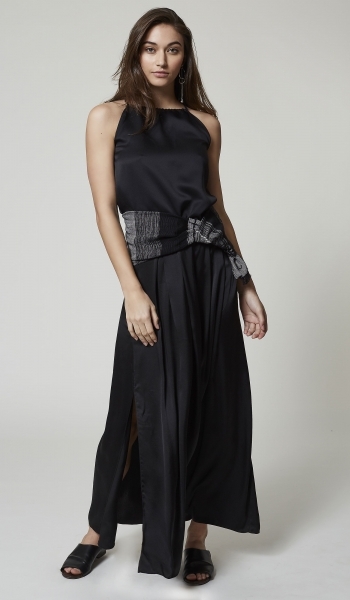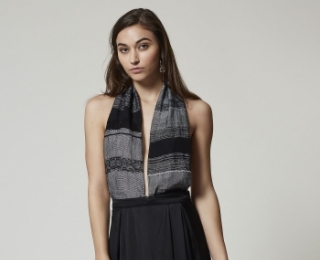The Metamorphic Dress: it’s CANGIARI’s Fashion Revolution

CANGIARI issues the challenge of convertible items in the new modular capsule designed by Denise Bonapace. A clothing convertibility where garments change shape through a special repositioning of details, making and unmaking them, with an always new identity. A handloom sash on an organic silk skirt, can become a belt or a top, transforming the outfit in an evening dress. A metamorphic dress.
The suggestion springs from CANGIARI’s identity, inseparably linked to social and environmental sustainability. In fact, CANGIARI (to change in Calabrian dialect), has its mission in its name: it wants to change an economy based on profits at all costs, an economy often blind to its responsabilities towards workers and the ecosystem.
A Fast Fashion model, based on low-cost production of garments with a very short life-cycle, which produces much more clothes than it can sell. Every year, 73 million tonnes of clothes are thrown away. A kilogram of cotton clothes consumes 11.000 litres of water (pesticide and chemical fertiliser excluded) giving off 23 kilograms of carbon dioxide in the atmosphere.
Moreover, behind low-cost t-shirts there are underpaid workers forced to produce in unsafe and unhealthy condition in developing countries. Five years ago, on 24th April 2013, Rana Plaza shopping centre in Bangladesh collapsed, resulting in over 1000 dead: it showed to the world the true cost of textile and fashion industry. The public indignation for the biggest disaster of the modern era in this sector, caused the raise of a Fashion Revolution global movement, born to ask trasparency about materials and production chain to fashion brands, thought the #Whomademyclothes? campaign.
Since its birth, in 2009, CANGIARI has been answering this question thought clear and specific choices: exclusively organic fabrics, derived from fibres grown without chemicals and a certified production chain. The entirely Made in Italy production chain includes most vulnerable groups of society inside the path of GOEL – Cooperative Group, the trade mark owner.
In 2017, CANGIARI, with its Ethical Bride line, suggested the re-use of the wedding dress, the shortest life-cycle garment, through the organic colouring. In 2018, CANGIARI issues the challenge of the Metamorphic Dress, in order to make people aware of the need to consume less, better and smartly. Because Beauty doesn’t admit exploitation and the Fashion Revolution goes through our awareness and responsability.
Ph. Ivan Genasi


